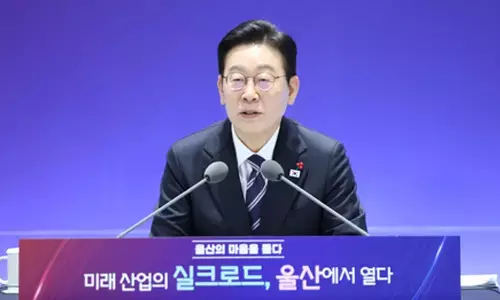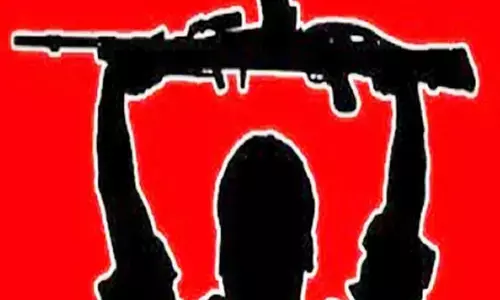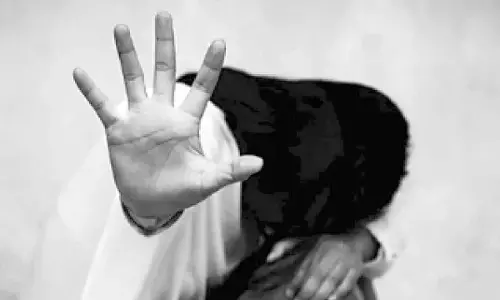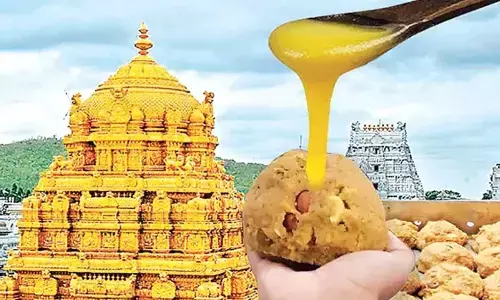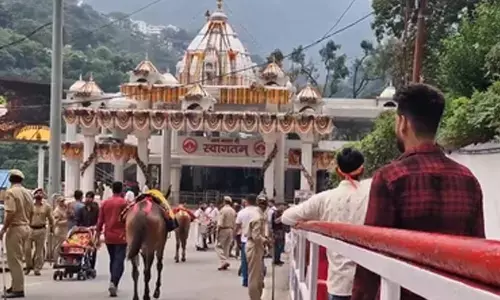Politics by proxy disturbing internal peace
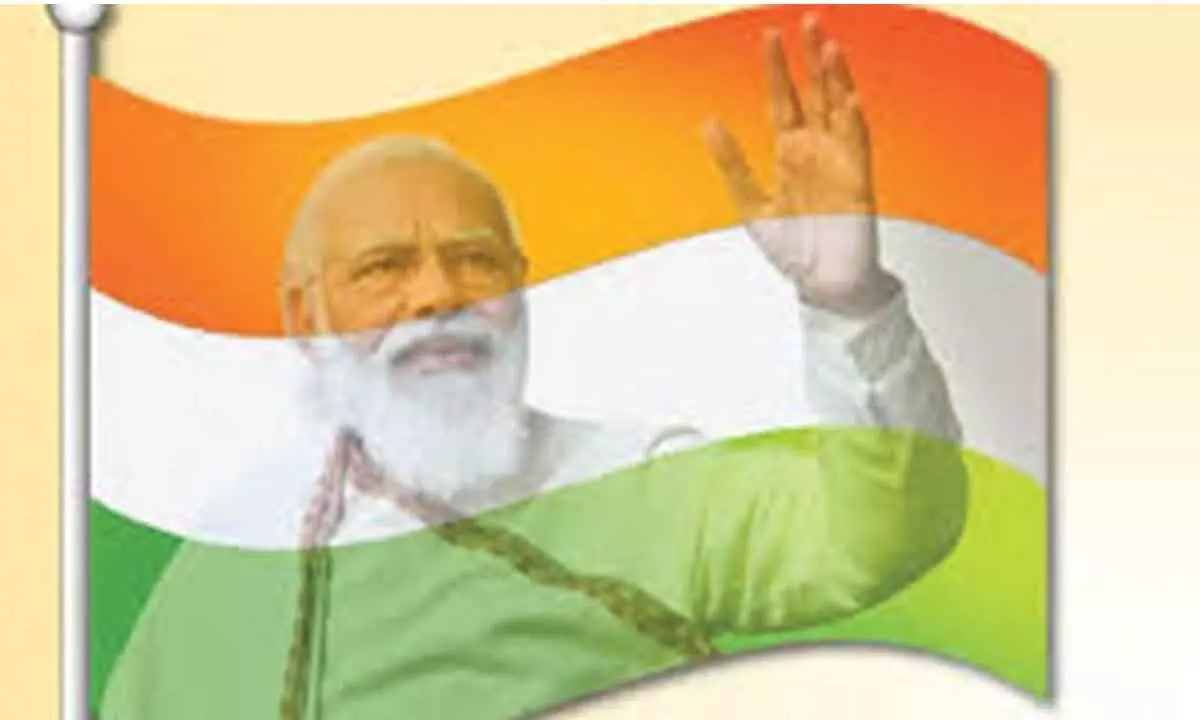
The diminished opposition in the second term of Prime Minister Narendra Modi in office has stepped up its propaganda offensive against the regime and in concert with certain civil society fora in the country and anti-India lobbies abroad, tried to build narratives to project Prime Minister Narendra Modi as a practitioner of majoritarianism, authoritarianism and an anti-minority policy.
The diminished opposition in the second term of Prime Minister Narendra Modi in office has stepped up its propaganda offensive against the regime and in concert with certain civil society fora in the country and anti-India lobbies abroad, tried to build narratives to project Prime Minister Narendra Modi as a practitioner of majoritarianism, authoritarianism and an anti-minority policy.
This 'alliance' has now tried to build a new theme for running down Modi's government by finding flaws with the latter's ability to 'build resilience against the threats to the strategic autonomy' of India. Clearly, there is no room for the opposition to fault Prime Minister Modi's handling of national security as such –the political will shown by him in ordering the surgical strike at Balakot in February 2019 in reply to the Pak-sponsored terror attack on a CRPF convoy at Pulwama was a glaring contrast to the Congress government's weak-kneed response to the horrific 26/11 attacks on Mumbai, and the clarity of decision-making that he displayed in ensuring a rapid build-up of our army in Eastern Ladakh following the Chinese aggressive conduct at Galwan valley in June 2020, to enable our troops to take on PLA there in a very direct manner – the approach of friendship towards China that Prime Minister Modi had legitimately adopted in his interactions with President Xi Jinping earlier was discarded without hesitation – all showed beyond doubt that India under Modi is totally geared to safeguarding national security.
Strategic autonomy is tested primarily on three fronts – defence, international relations and internal security. The common context to these is provided by the state of the country's economy – it is now universally accepted that national security is inseparable from economic security – and it is nobody's case that Prime Minister Modi did not have plans of economic recovery in the Covid affected scenario. In fact, Modi can be said to be even ahead of his economic advisors in constantly devoting to building India's economy – his emphasis on 'vocal for local', encouragement to entrepreneurship and start-ups and the policy of promoting 'ease of doing business' through comprehensive reforms in different sectors, speak for themselves.
Anti-Modi forces are tearing down every policy of the government and this gives away their true intentions. Floating intellectual debates on public issues to project tinted views should not become a route to 'politics by proxy.' There has been a concerted attempt of anti-BJP lobbies in India and abroad, elements of the opposition and the practitioners of 'minority politics' to unleash certain narratives to undermine the Modi government through non-Parliamentary means.
The Gujarat riots of 2002 largely provoked by a backlash of the gruesome burning to death of 60 Hindus, including children, returning from Ayodhya in a bogey of Sabarmati Express at Godhra Railway Station, were blamed on the alleged complicity of Modi – who was the Chief Minister of Gujarat then – by the anti-Modi lobby for long years. The Supreme Court of India has finally thrown out all those allegations, giving a clean chit to Modi which would rightly reinforce his image as a national leader.
International relations constitute one of the most important spheres of strategic autonomy and this has been handled by Modi exceptionally well. A consistent policy of opting for bilateral relations based on mutually beneficial economic and security gains, without detriment to the cause of world peace, enabled Modi to develop an ever-deepening friendship with the US, strong bonds with leading democracies like Japan, Australia and the European nations – apart from those of South East Asia and Israel - and an even relationship with the countries of the Gulf.
What is even more important, Modi struck a mutually sustainable friendship with Russian President Vladimir Putin – again with a personal equation at his level that has marked the international relations of India with major countries in Modi's time.
The Cold War had already ended with the dismemberment of the USSR as the Superpower and Russia was a diminished successor of the same. The West should have explored the possibility of democratically run former East European states like Ukraine having pacts with Russia for peaceful coexistence. It goes to the credit of Prime Minister Modi – now known as a world leader committed to a fair approach to international relations – that both Ukraine President Volodymyr Zelenskyy and Putin wanted him to act as the peacemaker and that Modi also lost no time in talking to both of them to call for immediate cessation of military action and resumption of peace talks.
India did not support the moves of the US and Russia in the UNSC. Many democratic powers like Australia, France and Germany did show a sense of understanding towards India's stand. Biden also did not make any direct criticism of India and in fact went on to describe the India-US friendship as potentially the best in the world. India has expressed its willingness to join any peace intervention on behalf of the UN. An upshot of India's successful foreign policy during the Modi regime is that the world is already acknowledging the advent of a multi-polar order.
The defence and foreign policies of the Modi government have proved effective, sustainable and long-range in application. The opposition and the anti-Modi lobbies have therefore concentrated on raking up issues that pertained to internal security, national cohesion and communal peace. They have taken recourse to agitational politics, militant street protests and whipping up of Hindu-Muslim discords. A concerted attempt was made to blame the Modi government for acts of violence – prevention of which squarely fell on the shoulders of the respective state governments. This happened in the recent incidents of communal violence and the protest calls against the Agnipath scheme of the Centre. A subsequent announcement of reservation in an entire set of organisations under the Defence and Home Ministries, takes the sting out of any criticism of the Agnipath scheme. How can something positive be rejected on the plea that the scale of employment offered is not large enough?
The narratives of authoritarianism, lack of attention to the poor or anti-minority bias remain in place because lobbies are active behind the opposition in pursuit of politics by other means. At present, the issue of perceived 'insult' caused to a religion, through some remarks or depiction against its Gods or Prophet, has come into limelight in India and is becoming instrumental in precipitating fanatic violence in public. The sensitivities of all communities have to be equally respected - an alleged 'criticism' of the Prophet or an 'insult' to some body's God cannot be treated differently.
Leaders of the Muslim minority in India are expected to acknowledge the legitimacy of Gods other communities believe in. The vulnerability of this country to communal conflicts has made this issue a potential destabiliser of internal security, particularly because radical extremists and enemy agents are out to cause an escalation under foreign guidance. We need 'intelligence from below' to deal with the situation.
Meanwhile, the ongoing advancement of India in the spheres of both national security and economic development is expected to keep the Modi government on the side of the people - India, it may be noted, has always found democratic means of appreciating or faulting the government on merit.
(The writer is a former Director of Intelligence Bureau. The views expressed are personal)









